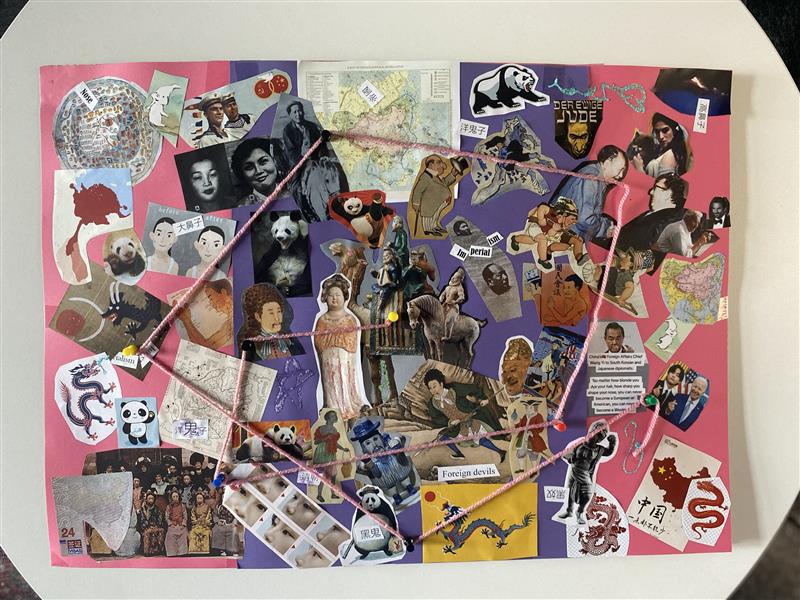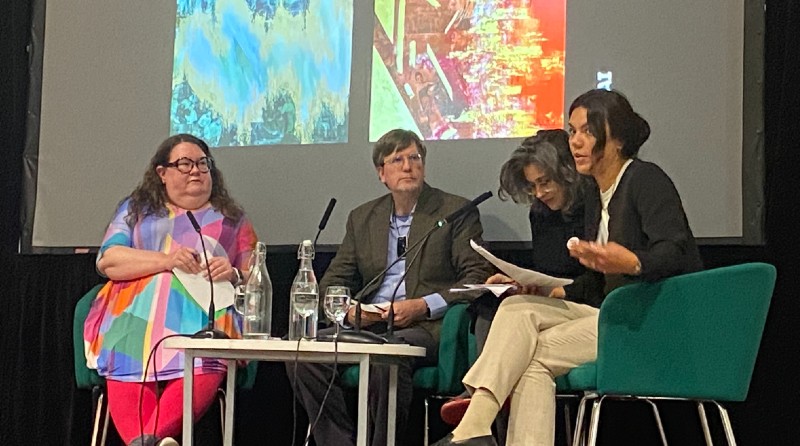On Wednesday 4 October 2023, Dr Saara Särmä, feminist, artist, and academic researcher from Tampere University, joined us for a public lecture to share her experience in researching IR through art and to discuss the perception of the research process and its methodologies in academic institutions. Sara Wong, who’s currently pursuing her PhD in the Department of International Relations at LSE, also joined in along with Dr Audrey Alejandro, Assistant Professor in the Department of Methodology at LSE. The event was chaired by Professor William A Callahan, Professor in the Department of International Relations at LSE.
L to R: Saara Särmä, William A Callahan (Chair), Audrey Alejandro, Sara Wong
Dr Särmä opened the lecture by reflecting on her nine years since she finished her PhD on feminism and nuclear proliferation in IR, which used internet parody images, recounting a moment when her work was described as “provocation” in the field. She used this to emphasise the challenges of navigating the academic discipline and the pressure to publish; she stated that neoliberal universities prioritise obtaining good publications over “allowing space for slow thought and experimentation.”
Every research project is different. But we’re trained to think that they can all follow similar processes, particularly the way in which funding proposals are written, which creates a fiction that every research process can be linear and neatly divided into manageable work packages.
Building on her experience, she shared with us her evolving approach to research, opting for a “do first, think later” method to preserve her creativity and challenge the abstract language surrounding ongoing discussions in IR. She also discussed her experience in using collage methodology in her research, highlighting its accessibility and its ability to engage with the complexity and messiness of the world, as opposed to the rationality and certainty in conventional academic discourse.
In the roundtable discussion that followed Dr Särmä’s presentation, Sara Wong introduced her field of research in IR. Researching Myanmar’s civil disobedience movement following the 2021 military coup, she pointed out the need to move beyond viewing artwork solely as a window into politics and instead consider how aesthetics and culture shape political actions. Dr Alejandro, on the other hand, acknowledged the value of creative research methods that Dr Särmä and Sara Wong discussed and suggested that for those already within the academic system, such as students and established researchers, traditional writing-based approaches are often preferred because of its familiarity. She also expressed how methodologies are inherently creative, and the distinction between traditional and creative approaches may not be as rigid as one might think.
Overall, the public lecture generated a very important discussion on the evolving landscape of research and the perception of creative methods in academia, especially in IR. I was struck by how collaging embodies the very heart of creativity in research. Dr Saara Särmä’s use of collage methodology reminded me that creativity isn’t confined to the realm of painting or writing; it’s about piecing together fragments to unveil fresh insights, which can ignite new perspectives and transform academic paths.
it’s about piecing together fragments to unveil fresh insights, which can ignite new perspectives and transform academic paths
Event report by Mariam Moussa, MSc International Relations

